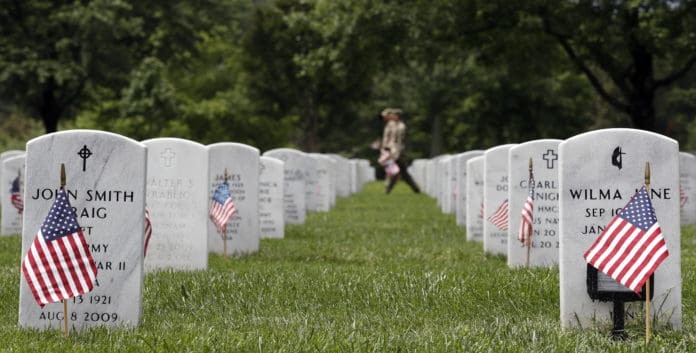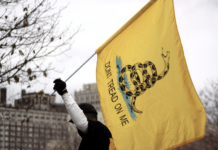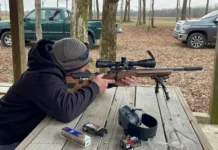
There’s a serenity about Section 60 at Arlington National Cemetery. It is a peaceful place. It’s where I choose to celebrate Memorial Day.
Some might feel it is an odd expression to say someone celebrates Memorial Day. This is the day, of course, set aside to memorialize those who have fallen in war defending our nation. Arlington National Cemetery’s Section 60 is where many of those men and women who fought and died in Iraq, Afghanistan and other far-flung places in the War on Terror are buried.
It is where they are at rest. Arlington National Cemetery is where I know too many names etched on the white marble headstones. It is 639 acres of ground sanctified by the blood of our nation’s warriors dating back to the Civil War. This ground, and the hundreds of national cemeteries around the country and overseas, is where millions will pause, remember these men and women and take stock of what they fought so bravely to preserve.
Their Lives
We visit their final resting places but hold them in our memories and in our hearts. That’s where they live. I celebrate them for the indelible mark they made on my life and the devotion to our nation’s highest ideals.
They are Marines with whom I served. I lived with them. I laughed with them. I struggled through dark days with them. And now, I celebrate them.
They were men like Major Doug Zembiec, known as the “Lion of Fallujah” who stood on tanks in the middle of battles to direct fire into buildings so his Marines could advance. Buried here too is Master Sgt. Aaron Torian, a Marine Special Operator who I came to know in 2006 when he patrolled areas south of Fallujah that were wrought with danger. There’s also Major Megan McClung, a marathoner who organized a forward-deployed Marine Corps Marathon race, complete with medals for the finishers.
They are among the dozens and dozens of men and women we pause to remember. I celebrate them.
Nothing negates the loss of these warriors. Time heals, but the absence lingers. There are moments for that. That’s not where I remain. I choose to celebrate them.
Their Gift
I celebrate that such men and women lived. They truly lived life to its full potential. They poured out their hearts for their nation they loved. They fought valiantly on the field of battle and they honored the ideals and promise of our nation with their sacrifice.
Many of us in the firearm industry know this. Many of us have worn our nation’s uniforms and ran to the sound of gunfire. We’ve mourned the days we lost men and women like these. Those were hard days, carrying flag-draped transfer cases aboard aircraft to be sent home one final time.
Especially those of us in the firearm industry, we know how truly fortunate we are to have such men and women among us. We are blessed that they stood to be counted and those who served alongside them know how much better we are because of them.
That’s why on Memorial Day, I invite you to celebrate them too. I invite you to be recognize the gift of freedom they preserved for our nation. Take a moment to honor that sacrifice and weigh the cost of the freedom we enjoy.
Then celebrate that such men and women lived.
Mark Oliva is Director, Public Affairs for the National Shooting Sports Foundation. He is a retired Marine Master Gunnery Sergeant with 25 years of service, including tours in Iraq, Afghanistan, Haiti, Albania, and Zaire.




Lest We Forget…
https://a57.foxnews.com/static.foxnews.com/foxnews.com/content/uploads/2021/05/918/516/2cartoon.5.28.21.jpg?ve=1&tl=1
…and let’s also remember – in addition to Arlington – all our brothers who died and were laid to rest in wartime graves outside our own borders. Those who were shipped abroad on our behalf, and never returned.
Thank you, all. Never forget.
There is a beautiful memorial WWII cemetery outside Manilla that took my breath away when I was there for a short visit, went back years later and spent the day. Just amazing, with a running commentary detailing the narrative of the war inscribed on the walls of an extensive structure with the chiseled names of over 50,000 Americans lost at sea in the Pacific war, with the graves of another 50,000 American and Filipino combatants from the theater just outside. Place is well maintained, usually empty. Really powerful. I think there is at least one other in Europe. There are a lot of headstones which proclaim “Known but to God”, stops your heart.
As long as the old glories are remembered
As long as the old stories are told
They live among us, still.
Below, is the first stanza of a poem titled, “Bivouac of the Dead”. Below that is a link to the Veteran’s Administration National Cemetery Administration. That link takes you to the full poem.
“Bivouac” is particularly striking today: “The Colonel” is being celebrated this year.
“BIVOUAC OF THE DEAD”
The muffled drum’s sad roll has beat
The soldier’s last tattoo;
No more on life’s parade shall meet
That brave and fallen few.
On Fame’s eternal camping-ground
Their silent tents are spread,
And Glory guards, with solemn round,
The bivouac of the dead.
https://www.cem.va.gov/history/BODpoem.asp
I celebrate them not because they lived, but because they fought.
And for those that served as Cavalrymen:
Fiddler’s Green
Halfway down the trail to Hell,
In a shady meadow green
Are the Souls of all dead Troopers camped,
Near a good old-time canteen.
And this eternal resting place
Is known as Fiddlers’ Green.
Marching past, straight through to Hell
The Infantry are seen.
Accompanied by the Engineers,
Artillery and Marines,
For none but the shades of Cavalrymen
Dismount at Fiddlers’ Green.
Though some go curving down the trail
To seek a warmer scene.
No Trooper ever gets to Hell
Ere he’s emptied his canteen.
And so rides back to drink again
With friends at Fiddlers’ Green.
And so when man and horse go down
Beneath a saber keen,
Or in a roaring charge of fierce melee
You stop a bullet clean,
And the hostiles come to get your scalp,
Just empty your canteen,
And put your pistol to your head
And go to Fiddlers’ Green.
“And the hostiles come to get your scalp,
Just empty your canteen,
And put your pistol to your head.
And go to Fiddlers’ Green.”
That last part reminds of Kipling’s “The Young British Soldier”…the last stanza:
“When you’re wounded and left on Afghanistan’s plains,
And the women come out to cut up what remains,
Jest roll to your rifle and blow out your brains
An’ go to your Gawd like a soldier.”
Four score and seven years ago our fathers brought forth on this continent, a new nation, conceived in Liberty, and dedicated to the proposition that all men are created equal.
Now we are engaged in a great civil war, testing whether that nation, or any nation so conceived and so dedicated, can long endure. We are met on a great battle-field of that war. We have come to dedicate a portion of that field, as a final resting place for those who here gave their lives that that nation might live. It is altogether fitting and proper that we should do this.
But, in a larger sense, we can not dedicate — we can not consecrate — we can not hallow — this ground. The brave men, living and dead, who struggled here, have consecrated it, far above our poor power to add or detract. The world will little note, nor long remember what we say here, but it can never forget what they did here. It is for us the living, rather, to be dedicated here to the unfinished work which they who fought here have thus far so nobly advanced. It is rather for us to be here dedicated to the great task remaining before us — that from these honored dead we take increased devotion to that cause for which they gave the last full measure of devotion — that we here highly resolve that these dead shall not have died in vain — that this nation, under God, shall have a new birth of freedom — and that government of the people, by the people, for the people, shall not perish from the earth.
Abraham Lincoln
November 19, 1863
Ths Gettysburg Address is among the framed documents (alonsode the DOI, USC, BOR, et al) in my study. Always relevant, today as much as then.
I’m glad they fought to stop evil. Stopping evil has a high cost. And they and their families paid for it.
“It is foolish and wrong to mourn the men who died. Rather we should thank God that such men lived”. General George S. Patton
‘It is foolish and wrong to mourn the men who died. Rather we should thank God that such men lived”. General George S. Patton’
Fused from something I read this morning:
“We mourn them because they are gone; we celebrate them because they lived.”
Although these words where spoken by Winston Churchill as a tribute to the RAF. Their meaning and sentiment seem appropriate for all who served.
‘Never in the field of human conflict was so much owed by so many to so few’
All of your thoughts, above, bring much deep emotion. It moves me to pray for those who do not honor, or refuse to honor those who have sacrificed all for this country. May God open their eyes and their hearts.
OLD ABE LINCOLN SURE KNEW HOW TO WRITE / SAY IT .
THANKS ON ALL THA COMMENTS Y’ALL
AS VETERAN , GOD BLESS AMERICA
OFF WALL THOUGHT WISH USA HAD MORE VETERANS IN LOW AND HIGHER OFFICE .
THINK THATS WHAT WRONG WITH MORE THAN HALF , THEY NEVER SERVED IN THE MILITARY .
War on Terror. That is so fraudulent. No terrorists in Iraq until we show up. We are in the largest terrorist racket yet. In Syria, we side with terrorists because they are trying to overthrow Assad. Nothing is more terrorist than illegally occupying a country’s land that did nothing to you and try to overthrow their government. Who’s the terrorist again? I keep forgetting.
Comments are closed.